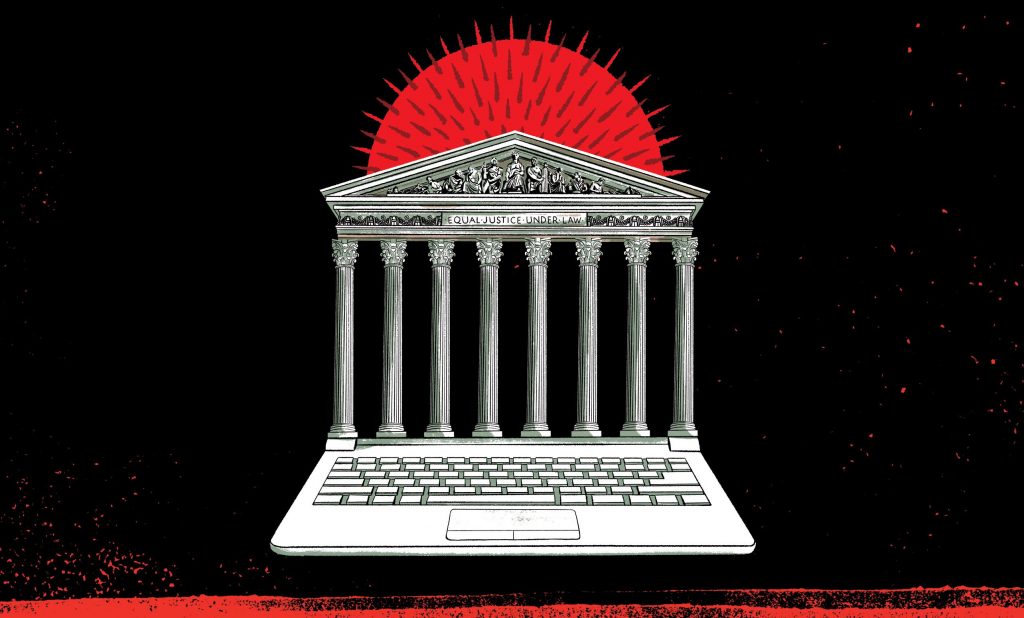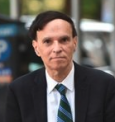Live for the First Time, It's the U.S. Supreme Court! | The Long Road for American Victims of Terror | SCOTUS Headlines: Justin Walker Faces New Questions
The US Supreme Court begins its historic first-ever phone arguments this morning, and we've got a look at the lawyers arguing today and next week. Thanks for reading, and we hope you are safe and well.
May 04, 2020 at 07:00 AM
10 minute read
Welcome to Supreme Court Brief—and good luck to the advocates arguing at this morning's historic first-ever telephonic arguments. We'll be tuned in. (Read the court's guidance here about how to listen to the session.) We take a look at the lawyers who will be part of the historic hearings this week and next, including seven attorneys who will make their high court debuts. Arnold & Porter's Kent Yalowitz shares some thoughts on the justices' breathing new life into a 16-year-old terror victim fight.
Thanks for reading, and your feedback is welcome and appreciated. Contact Marcia Coyle at [email protected] on Twitter at @MarciaCoyle. Stay safe, and be well.

Even the SCOTUS Vets Are Novices in First-Ever Phone Arguments
In the world of the coronavirus, even the veteran Supreme Court advocates who will argue in the 10 cases this week and next are novices—as they participate in the court's historic, first-ever telephonic arguments.
One veteran, Erica Ross, an assistant to the U.S. solicitor general, will hold the title of the first lawyer to argue in these historic arguments. Ross, who has made five high court arguments, will be the first lawyer to argue today, speaking on behalf of the government in the case U.S. Patent and Trademark Office v. Booking.com. She will make her argument from the solicitor general's conference room and will wear that office's traditional garb—a grey morning coat.
 The Stanford Law graduate is a former clerk to Justice Elena Kagan and a former partner in Jenner & Block's appellate and Supreme Court practice. Her opponent on the telephone will be Williams & Connolly partner Lisa Blatt (at left), who is making her 40th argument, more than any other female high court advocate. A University of Texas law school grad, Blatt will make her argument from her home's dining room outfitted with a table-top lectern.
The Stanford Law graduate is a former clerk to Justice Elena Kagan and a former partner in Jenner & Block's appellate and Supreme Court practice. Her opponent on the telephone will be Williams & Connolly partner Lisa Blatt (at left), who is making her 40th argument, more than any other female high court advocate. A University of Texas law school grad, Blatt will make her argument from her home's dining room outfitted with a table-top lectern.
"I'm going to replicate the process as much as possible," Blatt recently told The Washington Post.
>> There are a whopping seven genuine first-timers—nearly one-third of the 24 total who will argue during the court's two-week May session. Pennsylvania Chief Deputy Attorney General Michael Fischer makes his debut on Wednesday in the Affordable Care Act cases Little Sisters of the Poor v. Pennsylvania and Trump v. Pennsylvania. The scope of contraceptive coverage is at stake.
A Columbia Law grad, Fischer joined the attorney general's office after two years as senior counsel for the U.S. Senate Judiciary Committee. He has been in his current position since 2017. He is a former federal prosecutor and a former associate at Kellogg, Huber, Hansen, Todd, Figel & Frederick.
>> Carey Dunne, general counsel at the Manhattan District Attorney Office, will argue in the presidential tax record fight, Trump v. Vance, on March 12. He is a former partner at Davis Polk & Wardwell and a former president of the New York City Bar Association. And in the separate presidential records battle, Trump v. Mazars and Trump v. Deutsche Bank, Consovoy McCarthy partner Patrick Strawbridge makes his debut on behalf of President Donald Trump. Strawbridge is a former clerk to Justice Clarence Thomas.
>> Also making their first arguments are Oklahoma Solicitor General Mithun Mansinghani in the case McGirt v. Oklahoma on May 11 and Eric Rassbach, senior counsel at the Becket Fund for Religious Liberty, in the combined cases Our Lady of Guadalupe School v. Morrissey-Berru and St. James School v. Biel. In McGirt, the tribal reservation case, "The governance of half of my entire state is at issue," Masinghani, a former Gibson, Dunn & Crutcher associate, told The National Law Journal.
>> Colorado Attorney General Philip Weiser will make his first argument May 13 against another newcomer, Jason Harrow, chief counsel at Equal Citizens, in the "faithless elector" case Colorado Department of State v. Baca. Weiser is a former U.S. deputy assistant attorney general and dean of the University of Colorado Law School. He clerked for Justices Byron White and Ruth Bader Ginsburg. Harrow is a Harvard Law graduate and former New York assistant solicitor general.
And the justices will hear some very familiar voices from such veterans as U.S. Solicitor General Noel Francisco (Little Sisters and Trump v. Vance); former solicitor general and Kirkland & Ellis partner Paul Clement (Little Sisters); former acting U.S. solicitor general and Jenner & Block partner Ian Gershengorn (McGirt v. Oklahoma), Latham & Watkins partner Roman Martinez (Barr v. Association of Political Consultants), and U.S. Principal Deputy Solicitor General Jeffrey Wall (Trump v. Mazars). —Marcia Coyle

Justices Keep Alive Long Legal Fight for American Terror Victims
Some of the most difficult cases to litigate and win are actions seeking compensation for victims of international terrorism. Last week, the Supreme Court kept alive two such cases, nearly two decades old, by "GVR"—granting the petitions and vacating and remanding unfavorable decisions by the U.S. Courts of Appeal for the Second and D.C. circuits for further consideration of new federal law.
Arnold & Porter partner John Elwood was counsel of record, along with partner Kent Yalowitz, in Sokolow v. Palestine Liberation Organization, and Steven Perles of Perles Law Firm was counsel of record in Klieman v. Palestinian Authority, stemming from lawsuits filed in 2004 and 2005 respectively, on behalf of the families of Americans murdered or injured during terrorist attacks in Israel between 2001 and 2004.
Yalowitz entered the Sokolow case in May 2013 and took it to trial, winning a judgment in favor of 40 plaintiffs totaling $655.5 million. But the Second Circuit vacated the judgment for lack of personal jurisdiction. The jurisdiction issue also went against Perles in the D.C. Circuit.
After the 2019 Second Circuit decision, Elwood, who had recently joined the firm, took the lead on the Supreme Court petition. "I was really glad he was in the firm when we started to think about going back to the Supreme Court," said Yalowitz. "He has been great."
Almost immediately after the Promoting Security and Justice for Victims of Terrorism Act became law in December 2019, Elwood and Perles filed supplemental briefs with the Supreme Court urging the justices to GVR their petitions. Congress, they argued, for the second time in 14 months, had enacted legislation specifically to restore jurisdiction in civil anti-terrorism cases against the Palestinian Authority.
On remand, Yalowitz said he expects the circuit court to issue an order requesting further briefing on the impact of the 2019 law. Their opponents, represented by Gassan Adnan Baloul, partner at Squire Patton Boggs, have argued that plaintiffs should pursue their jurisdictional claims in a new, parallel case filed in district court.
"We had 40 individuals who lost loved ones and testified at the [original] trial," recalled Yalowitz. "Two of the parents have died since then. That's a heavy burden to put on people. Ultimately it's up to the judiciary whether to force them to redo that. Nothing would be gained; no fairness would be gained. I'm hoping the Second Circuit sees that." —Marcia Coyle

Supreme Court Headlines: What We're Reading
Trump Nominee, Once a Supreme Court Clerk, Still Unhappy at how Obamacare Ruling Played Out. "The greatest words you can hear from Justice Kennedy are: 'You're hired,'" D.C. Circuit nominee Justin Walker said at a March 13 investiture ceremony for the Kentucky federal district court, a position for which the ABA deemed him unqualified. "And the worst words are: 'The chief justice thinks this might be a tax.'" [CNN] The New York Times looks at Walker's support for judges keeping unrestricted ties to the conservative Federalist Society. Walker heads to the Senate Judiciary Committee on Wednesday.
Live-Streamed and Teleconferenced, the Supreme Court Enters the Coronavirus Era. "If other courts' experiences are any guide, the new format could stray from the crisp hourlong sessions that Chief Justice Roberts strives to run." [WSJ]
Phoning It In: Pandemic Forces Supreme Court to Hear Cases in a New Way. "The new format means than many formalities will be set aside. Some of the lawyers who will argue the cases have said they plan on wearing comfortable clothing – jeans and T-shirts – and will address the justices from kitchens and spare bedrooms, not from behind a lectern in the courtroom." [Reuters]
At Long Last, the Supreme Court Is Going Live On Air. "The court's decision to conduct its business during the pandemic by teleconference is not that much of a surprise because so many other organizations have done the same. The remarkable development is the justices' unexpected step of live coverage," Bruce Collins, general counsel to C-SPAN, writes. [Washington Post]
A Citizen's Guide to SCOTUS Live. "When his initial questioning is complete, the Associate Justices will then have the opportunity to ask questions in turn in order of seniority. I am not sure that this will work as well as hoped; some of the justices strike me as willing to ask questions for the full 30 minutes of argument, leaving no time for anyone else. Whether Roberts will intervene in such an instance remains to be seen." [The Atlantic]
How the Supreme Court Is Preparing for Its First Big Phone Hearing. "To prepare, the Supreme Court has reached out to lawyers involved in its cases to begin scheduling test sessions. Court staffers have encouraged the lawyers who will argue to use landlines and provide alternate phone numbers in case problems arise. Only those lawyers designated to argue will be able to dial in directly to the line connected to the justices. But the court has told those lawyers that other attorneys may be in the room with them." [CNN]
 In the Pandemic, State and Federal Judges Lean on Technology. "Without the technological capacity, we cannot be hearing remote arguments. We could not be having filings electronically in a smooth way," Judge Robert Katzmann (at left) of the U.S. Court of Appeals for the Second Circuit said. "We're able to do what we're doing really because of technology. … Coming out of this, I think that we will all need to step back and rethink and make sure our technological capacity can meet any challenge." [NLJ]
In the Pandemic, State and Federal Judges Lean on Technology. "Without the technological capacity, we cannot be hearing remote arguments. We could not be having filings electronically in a smooth way," Judge Robert Katzmann (at left) of the U.S. Court of Appeals for the Second Circuit said. "We're able to do what we're doing really because of technology. … Coming out of this, I think that we will all need to step back and rethink and make sure our technological capacity can meet any challenge." [NLJ]
The Supreme Court Confronts Trump's Challenge to the Separation of Powers. "The Chief Justice may want to find a nonpartisan compromise—but, in these cases, one does not exist. That would counsel in favor of the Court standing up to the other branches and enforcing the separation of powers in a merits decision, much as it did in the Nixon case. For those at the top of the judicial branch, there is a motivation that is greater than partisanship: the desire to retain the perception of legitimacy that is most crucial to maintenance of its power." [The New Yorker]
What Is at Stake as the Supreme Court Weighs the Future of Immigrant 'Dreamers'. "The decision will be one of the most-watched of Trump's presidency. Here is what you need to know about it." [Reuters]
This content has been archived. It is available through our partners, LexisNexis® and Bloomberg Law.
To view this content, please continue to their sites.
Not a Lexis Subscriber?
Subscribe Now
Not a Bloomberg Law Subscriber?
Subscribe Now
NOT FOR REPRINT
© 2025 ALM Global, LLC, All Rights Reserved. Request academic re-use from www.copyright.com. All other uses, submit a request to [email protected]. For more information visit Asset & Logo Licensing.
You Might Like
View AllSupreme Court Brief: Billable Hours Rounding Error? | CFPB Imperiled?

The Supreme Court Leaker That Never Was | This Term's 1st Opinion | Attorney-Client Privilege
9 minute read
Former Clerks Face Off As Arguments Resume | Ex-Sotomayor Clerk Joins Cooley | Water War Returns | Headlines: 'Meet SG3'
Law Firms Mentioned
Trending Stories
- 1No Two Wildfires Alike: Lawyers Take Different Legal Strategies in California
- 2Poop-Themed Dog Toy OK as Parody, but Still Tarnished Jack Daniel’s Brand, Court Says
- 3Meet the New President of NY's Association of Trial Court Jurists
- 4Lawyers' Phones Are Ringing: What Should Employers Do If ICE Raids Their Business?
- 5Freshfields Hires Ex-SEC Corporate Finance Director in Silicon Valley
Who Got The Work
J. Brugh Lower of Gibbons has entered an appearance for industrial equipment supplier Devco Corporation in a pending trademark infringement lawsuit. The suit, accusing the defendant of selling knock-off Graco products, was filed Dec. 18 in New Jersey District Court by Rivkin Radler on behalf of Graco Inc. and Graco Minnesota. The case, assigned to U.S. District Judge Zahid N. Quraishi, is 3:24-cv-11294, Graco Inc. et al v. Devco Corporation.
Who Got The Work
Rebecca Maller-Stein and Kent A. Yalowitz of Arnold & Porter Kaye Scholer have entered their appearances for Hanaco Venture Capital and its executives, Lior Prosor and David Frankel, in a pending securities lawsuit. The action, filed on Dec. 24 in New York Southern District Court by Zell, Aron & Co. on behalf of Goldeneye Advisors, accuses the defendants of negligently and fraudulently managing the plaintiff's $1 million investment. The case, assigned to U.S. District Judge Vernon S. Broderick, is 1:24-cv-09918, Goldeneye Advisors, LLC v. Hanaco Venture Capital, Ltd. et al.
Who Got The Work
Attorneys from A&O Shearman has stepped in as defense counsel for Toronto-Dominion Bank and other defendants in a pending securities class action. The suit, filed Dec. 11 in New York Southern District Court by Bleichmar Fonti & Auld, accuses the defendants of concealing the bank's 'pervasive' deficiencies in regards to its compliance with the Bank Secrecy Act and the quality of its anti-money laundering controls. The case, assigned to U.S. District Judge Arun Subramanian, is 1:24-cv-09445, Gonzalez v. The Toronto-Dominion Bank et al.
Who Got The Work
Crown Castle International, a Pennsylvania company providing shared communications infrastructure, has turned to Luke D. Wolf of Gordon Rees Scully Mansukhani to fend off a pending breach-of-contract lawsuit. The court action, filed Nov. 25 in Michigan Eastern District Court by Hooper Hathaway PC on behalf of The Town Residences LLC, accuses Crown Castle of failing to transfer approximately $30,000 in utility payments from T-Mobile in breach of a roof-top lease and assignment agreement. The case, assigned to U.S. District Judge Susan K. Declercq, is 2:24-cv-13131, The Town Residences LLC v. T-Mobile US, Inc. et al.
Who Got The Work
Wilfred P. Coronato and Daniel M. Schwartz of McCarter & English have stepped in as defense counsel to Electrolux Home Products Inc. in a pending product liability lawsuit. The court action, filed Nov. 26 in New York Eastern District Court by Poulos Lopiccolo PC and Nagel Rice LLP on behalf of David Stern, alleges that the defendant's refrigerators’ drawers and shelving repeatedly break and fall apart within months after purchase. The case, assigned to U.S. District Judge Joan M. Azrack, is 2:24-cv-08204, Stern v. Electrolux Home Products, Inc.
Featured Firms
Law Offices of Gary Martin Hays & Associates, P.C.
(470) 294-1674
Law Offices of Mark E. Salomone
(857) 444-6468
Smith & Hassler
(713) 739-1250







